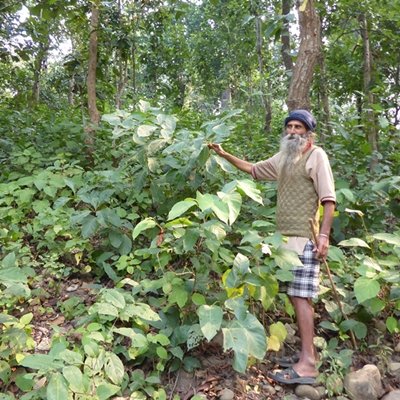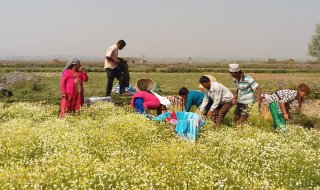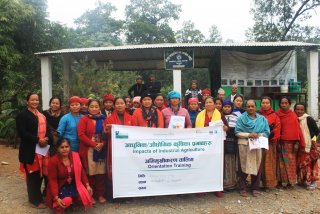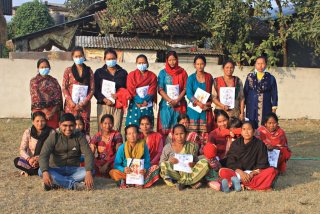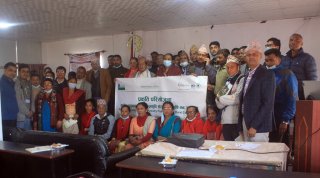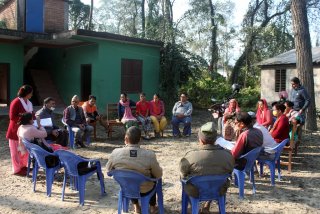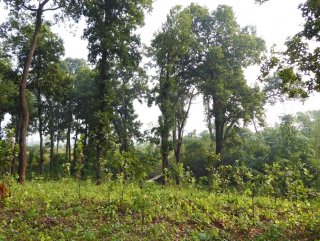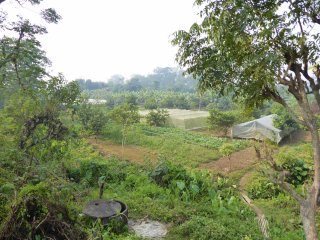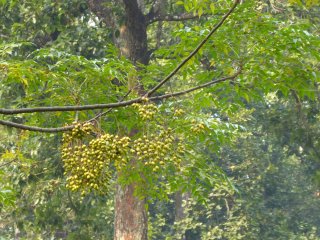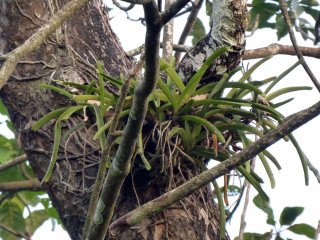Nature Conservation and Agroforestry Production in Rural Communities, Nepal
Funded by the BMU through the International Climate Initiative
In 2021, the Manfred-Hermsen-Stiftung has started a three-year nature and climate protection project in Nepal, which will be implemented in cooperation with our local partner ANSAB (Asian Network for Sustainable Agriculture and Bioresources). The Federal Ministry for the Economic Affairs and Climate Action supports the project together with the Federal Ministry for Environment via the Medium Grants of the International Climate Initiative (IMG).
The project area is located between the Himalaya and the Terai lowlands in southern Nepal, in the middle of a biodiversity hotspot, and includes approximately 20,000 hectares of forest and 1,000 hectares of smallholder agricultural land near the Chitwan National Park. It is home to the Bengal tiger, elephant, rhinoceros, Ganges gavial and many more rare and threatened species. However, human pressure and climate change are jeopardizing the forests with their extraordinary biodiversity, and deteriorating the watersheds of this sensitive region.
News Update
The project
Building on a proven concept, administrative rights are transferred to local communities, ecological management is ensured, and the habitats of many rare native species are brought into better condition and connected with each other.
Project activities include:
- Assistance to community forest user groups in the transfer of administrative rights and local capacity building.
- Inventory of forest resources, including medicinal herbs and other non-timber forest products.
- Prevention and control of forest fires and promotion of alternatives to the use of firewood.
- Organizational support for small farmers, training in organic farming, humus building, and management of wildlife conflicts.
- Support in the certification of forest and agricultural land according to criteria of organic farming and wild collection and wildlife-friendly practies.
- Supporting enterprise development in the marketing of sustainable products and local ecotourism.
- Formation of an association with entrepreneurs, government agencies, and communities with the goal of promoting the production and marketing of sustainable local products.
- Creation of environmental education materials for local schools, training of teachers and multipliers, creation of an environmental education trail, and awareness raising through local media.
Hence, the project combines conservation measures with the formation of an alliance between authorities, forest user communities, local producers, and entrepreneurs, combining ideas and resources.
About 30,000 people benefit directly and 100,000 indirectly by strengthening their resilience to climate change and global crises and improving the livelihoods of marginalised groups. We anticipate that additional 30,000 hectares of surrounding forest will be positively impacted since local communities use the project measures as a model for replication.
Through the project internvetions, we aim to increase the forest carbon stock in the project area by 665,000 tCO2e within three years.
News Update: Toolkits and Carbon Baseline Report published
Implementation of the new National Forest Stewardship Standard (NFSS) has been initiated with 40 Community Forest User Groups (CFUGs). So far, 14,032 ha of forest were brought under improved management practices through the development of forest management plans in line with the NFSS, training to community forest user groups (CFUGs) on sustainable forest management following NFSS standards, and the project´s forest fire prevention and control campaign.
Promoting wildlife-friendly and organic farming practices, 25 local farmer groups have been formed and 260 ha of farm land brought under improved management. A total of 519 farming households are benefitting from improved knowledge and capacity on organic production and handling practices, market linkage, and access to government programs and facilities.
Toolkits on sustainable harvesting of Non-timber Forest Products and Organic Farming practises were developed for local resource persons and technicians while delivering trainings at the community level. These toolkits were made available in Nepali and English language as reference materials.
Toolkits: Sustainable harvesting of Non-Timber Forest Products (NFTPs)
Organic Farming Practises
The baseline assessment of the forest carbon stock determined 27.13 million tCO2e stored in 48,300 ha of forest land that lies within the project´s municipalities, projecting an increase of 665,000 tCO2e over approximately three years through improved forest management practices.
Link to Publication: Baseline Forest Carbon Assessment
Our partner ANSAB Project website
This video shows the results of our pilot project, being the basis for the IKI project N.E.P.A.L., which started in 2021:
Independent complaint mechanism of the International Climate Initiative

